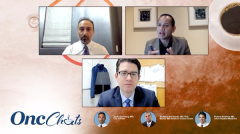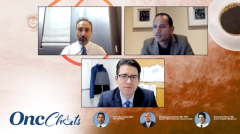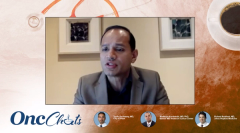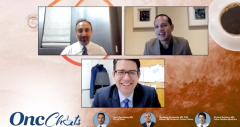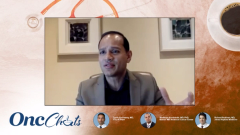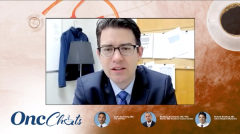
Taking Organoids From Bench to Bedside Through Endoscopy in Pancreatic Cancer: Role of the Gastroenterologist
In this first episode of OncChats: Taking Organoids From Bench to Bedside Through Endoscopy in Pancreatic Cancer, Toufic A. Kachaamy, MD, Madappa Kundranda, MD, PhD, and Richard Burkhart, MD, discuss the involvement of the gastroenterologist from diagnosis to palliative care in the management of patients with pancreatic cancer.
Episodes in this series

In this first episode of OncChats: Taking Organoids From Bench to Bedside Through Endoscopy in Pancreatic Cancer, Toufic A. Kachaamy, MD, of City of Hope, Madappa Kundranda, MD, PhD, of Banner MD Anderson Cancer Center, and Richard Burkhart, MD, of Johns Hopkins Medicine, discuss the involvement of the gastroenterologist from diagnosis to palliative care in the management of patients with pancreatic cancer.
Kachaamy: Hi everyone. I’m Dr Toufic Kachaamy. I’m chief of medicine and director of gastroenterology at City of Hope, in Phoenix, Arizona. I’m joined today by Dr Richard Burkhart, a surgical oncologist and a scientist from Johns Hopkins, [in Baltimore, Maryland].
Dr Burkhardt focuses his career on adding the latest scientific evidence to take care of patients [with cancer], specifically [those with] pancreatic cancer. He is an expert in organoids, which is a topic we will be discussing, especially as it relates to endoscopic oncology.
I’m also joined by Dr Madappa Kundranda, the division chief of cancer medicine at Banner MD Anderson in Phoenix, Arizona. Thank you, everyone for joining me today.
Burkhart: Thanks for having me. It’s great to join you guys.
Kachaamy: Thank you. I’m going to start by asking you a general question: How important do you think [it is] for a gastroenterologist who is familiar with oncology to be part of the multidisciplinary gastrointestinal cancer team?
Burkhart: That’s a wonderful question and a great starting point. In reality, endoscopists are central and fundamental to the care of our patients with pancreatic cancer at every single stage. When we think about how we manage patients in the modern experience, it starts with the identification of a tumor and then, confirmation of a diagnosis. [Although] CT scans and MRIs can be suggestive that a patient may have pancreatic cancer underlying their symptoms, the true diagnostic tool we utilize is endoscopic ultrasound with biopsy. So, right from the outset, endoscopists are the fundamental component of a high-quality multidisciplinary clinic experience.
Beyond diagnosis, though, the endoscopists that we work with every day contribute to patient care at every stage. So, from diagnosis into the palliation of treatments [for patients] who are planning to receive chemotherapy. This is through techniques like ERCP and stenting of the common bile duct, and techniques like an alcohol celiac plexus block, which can be administered by an endoscopic approach. This allows our patients to get to therapy quicker than the historical methods of palliation that we would use surgically. When we go to the next step, and we talk about the treatment of patients with pancreatic cancer as they continue through their therapy, endoscopists can play a critical role in the palliation of symptoms as we move forward. This is both for localized disease, but also for patients with locally advanced disease or, God forbid, disease that has spread. This is through approaches to decompress the biliary tree through gastrohepatostomy, or ERCP, or even an endoscopic bypass procedure where we can create gastrojejunostomy via endoscopy or endoscopic approaches.
Lastly, as we think about how to integrate the modern research experience into the clinical care of patients, and as we think about precision medicine, our endoscopists and gastroenterologists are the folks that we rely upon to obtain tissue to clarify and study a patient’s disease. We’ll talk about that a little bit together, but it really is the endoscopist who allows us to do all these things.
Kachaamy: Thank you. Thank you for this overview.
Check back tomorrow for the next episode in this series.
Register for the upcoming Advances and Innovations in Endoscopic Oncology and Multidisciplinary Gastrointestinal Cancer Care meeting: https://whova.com/portal/registration/cgcc_202304/


